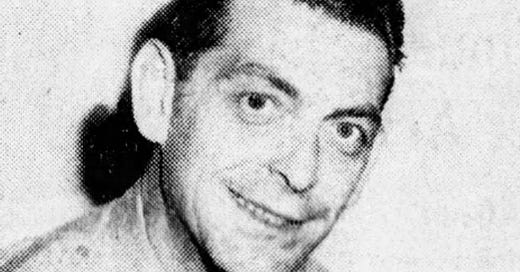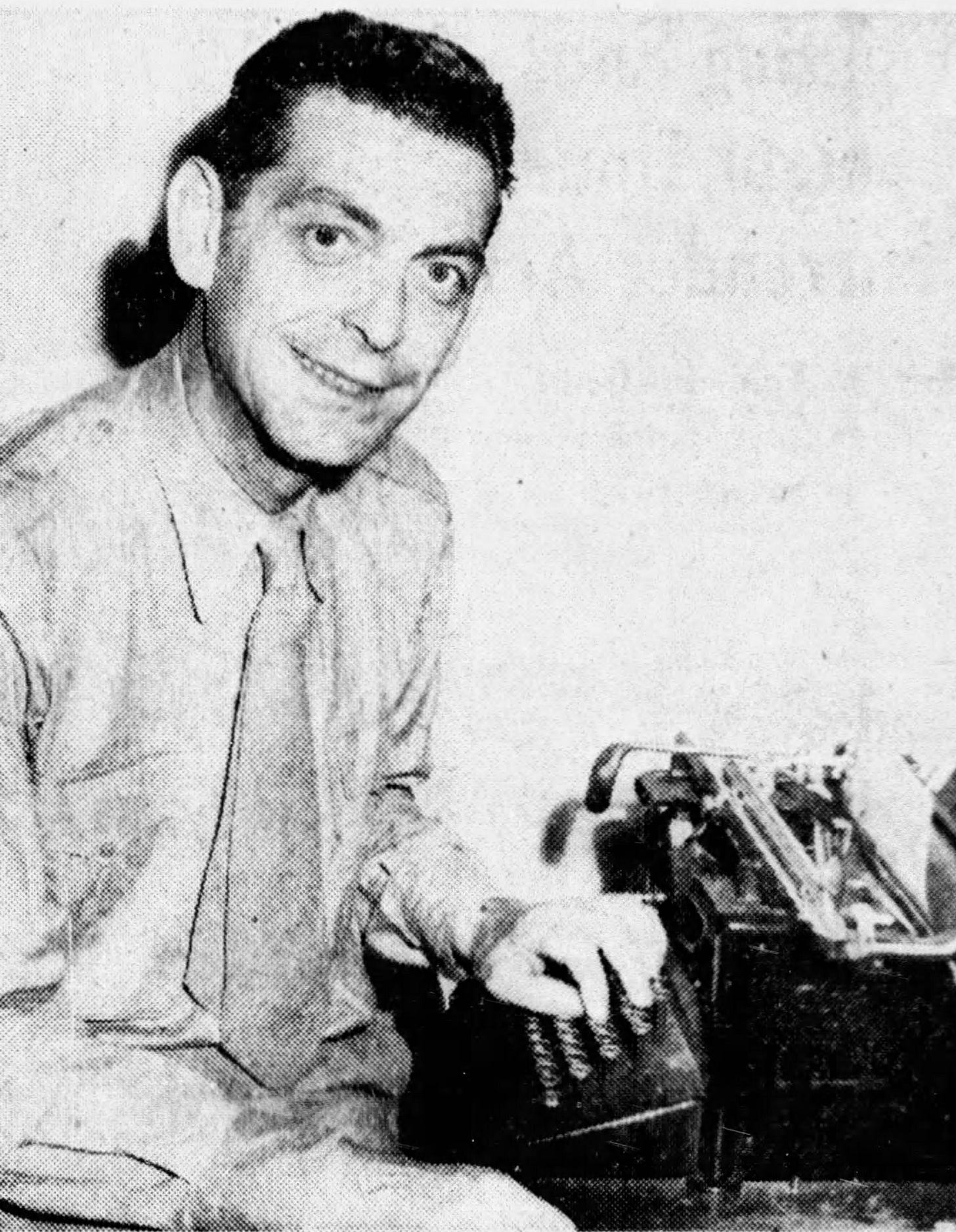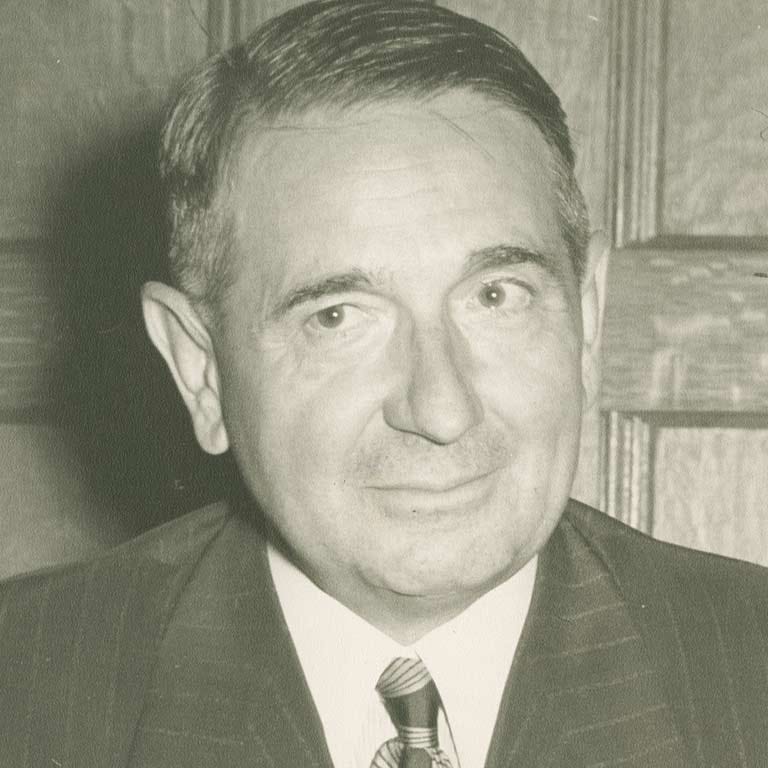Germany surrenders: Ed Kennedy's day of infamy
Around 3 p.m. on May 7, 1945, Associated Press Paris bureau chief Edward Kennedy made the decision that would change the course of his life.
Twelve hours earlier, Kennedy and 16 other correspondents had watched representatives from Germany sign the documents that ended the war in Europe, but they had been forbidden from reporting the momentous news.
The victorious Allied powers wanted a coordinated announcement of the surrender, with Joseph Stalin in particular pushing for a carefully orchestrated ceremony in Berlin on the afternoon of May 8.
The correspondents who had witnessed the signing at Gen. Dwight D. Eisenhower's headquarters in Reims, France, were furious, as were the dozens of other reporters back at press headquarters in Paris. The war was over, at last. What was to be gained by delaying release of the news?
Shortly after 2 p.m., German radio in Flensburg broadcast a statement from foreign minister Ludwig Schwerin von Krosigk saying the high command had "declared the unconditional surrender of all fighting German troops."
The BBC aired a translation of the announcement minutes later. Kennedy heard it in the AP’s office on the fourth floor of the Hotel Scribe and decided he had to act.
Flensburg was occupied by British troops, so Kennedy was certain SHAEF had permitted the broadcast — which made sense, since the sooner German troops heard the news the less chance there was of further bloodshed.
The censorship regulations Kennedy and hundreds of other correspondents had followed for years were nominally in place to protect military security. Officials inevitably tried to stretch that definition as far as they could at times, but Kennedy felt it was clear that the continued hold on the surrender news was purely political.
As recounted in a posthumously published memoir, Ed Kennedy’s War, he visited the office of the chief American censor at the Scribe, Lt. Col. Richard H. Merrick, and made his case. Merrick said he had his orders and wasn’t authorized to release anything regardless of where else the news might have been announced.
Kennedy believed he had every right to release the story and told the officer he would do just that. Merrick shrugged and said, “Do as you please,” undoubtedly believing the wide-ranging censorship apparatus would prevent Kennedy from getting his story out.
Kennedy retired to his room briefly to ponder his options, then returned to the office, where he asked his colleague Morton Gudebrod to get on the military telephone line and call the AP’s London bureau. The main news desk phone rang at about 3:24 p.m., and Russell Landstrom picked it up.
He heard a faint, muffled voice saying “This is Paris calling,” and handed the phone to AP newsman Lewis Hawkins. Hawkins heard the voice say Germany had surrendered unconditionally but didn’t know who he was talking to and needed more details.
At that point Kennedy picked up the phone and said, “This is Ed Kennedy, Lew. Germany has surrendered unconditionally. That’s official. Make the date(line) Reims, France, and get it out.”
Hawkins sent a flash to the AP foreign desk in New York at 3:26 p.m. (9:26 a.m. in New York) that read: “REIMS, France — Allies officially announced Germany surrendered unconditionally.”
The phone got passed to other staffers on the AP news desk as Kennedy dictated a proper story over the shaky connection. Meanwhile, editors in New York held onto the flash to ensure they had it right, releasing it at 9:35 a.m. Eastern War Time after learning of the details Kennedy had sent.
He managed to dictate 200 to 300 words to London before the phone line failed for good, but that was more than enough to make history — not to mention the front pages of extra editions across the U.S. and Canada. His story began:
REIMS, France (AP) -- Germany surrendered unconditionally to the Western Allies and Russia at 2:41 a.m. French time Monday.
The surrender took place at a little red schoolhouse which is the headquarters of Gen. Eisenhower.
The surrender which brought the war in Europe to a formal end after five years, eight months and six days of bloodshed and destruction was signed for Germany by Col. Gen. Gustav Jodl.
(Though Jodl’s first name was Alfred, the initial news reports referred to him as Gustav. He signed only his last name on the documents.)
Though the news Kennedy reported was cause for celebration throughout the world, the professional recriminations began almost immediately.
His fellow correspondents raged at the breach of protocol, and Allied officials took immediate action. Within an hour, public relations chief Brig. Gen. Frank Allen Jr. issued a statement banning all Associated Press correspondents in the European theater from filing copy until further notice.
AP leadership in New York learned of the suspension via stories on rival wire services, prompting AP general manager Kent Cooper to dash off inquiries to Eisenhower and Secretary of War Henry Stimson demanding an explanation:
The International News Service and United Press have distributed dispatches throughout the world that The Associated Press has been cut off from all news privileges throughout the European war theatre. No such notice has been received by The Associated Press, but if this has occurred please extend to The Associated Press the courtesy of telling me why the action was taken and if taken as a disciplinary measure please state what is the indictment and explain why the entire Associated Press should be involved. If one individual has done something to incur this procedure, who is the individual and what did he do?
News organizations throughout the United States jumped to the AP’s defense, decrying the move as an affront to the First Amendment — plenty of which was duly documented and moved for publication by the AP.
Among the most notable advocates quoted by the wire service was Roy W. Howard, president of Scripps-Howard Newspapers, who sent President Truman a telegram from San Francisco urging him to lift the ban. Howard’s input was notable because he had prematurely reported news of the armistice that ended World War I in November 1918, filing a story to the United Press wire that the war was over four days before the peace agreement actually occurred.
Allen’s order didn’t last long. About six hours later, the AP received a short dispatch from Austin Bealmear in Paris describing peace celebrations in the French capital. Along with it came word that only Kennedy would remain under suspension; all other AP correspondents in Europe were free to file as usual.
But the fallout was just beginning for Kennedy. While the AP moved a lengthy sidebar describing in minute detail how he had attained a news beat “acclaimed by editors throughout the United States as one of the greatest in newspaper history,” rival correspondents were out for blood — particularly because SHAEF still refused to release their surrender stories.
The May 8 New York Times included a boxed item on page 4 reprinting a message it had received from its correspondent Drew Middleton in Paris:
My story for tonight is held by censorship, why heaven only knows, as it already has been published in New York. I have been working steadily on it for thirty-four hours and like the rest of us here, except The Associated Press, have been caught in the most colossal ‘snafu’ in the history of the war. I am browned off, fed up, burnt up and put out. The story probably will be released tomorrow, which will only be twenty-four hours late.
Correspondents assigned to SHAEF met as a group and drafted a scathing letter to Eisenhower asking him to reinstate the full ban on the AP. Middleton and 53 other correspondents signed it, but eight of the other 16 besides Kennedy who had witnessed the surrender in Reims declined to do so.
The letter called Kennedy’s action “the most disgraceful, deliberate and unethical double cross in the history of journalism” but placed the blame on the entire AP.
“Any position that the Associated Press as an organization was not guilty of the infraction of SHAEF regulations is in our opinion incomprehensible. The organization in question published the story and made no effort whatever to retract it when it became evident that its publication was a flagrant violation of SHAEF security regulations imposed on all other correspondents concerned.”
Eisenhower rejected the request, saying only the War Department could punish the entire organization, but SHAEF did include Morton Gudebrod in the suspension for his role in the story’s release.
Allen would double down on his response, attempting to undercut Kennedy’s argument that no question of military security was at stake by suggesting his early report of a surrender might have caused the agreed-upon later announcement to break down “and therefore prolong the war.”
Kennedy would write later: “I have yet to meet anyone who can make sense of this assertion.”
The initial hours after the controversy erupted saw most professional critics come down on Kennedy’s side. Take, for example, the editorial in the May 8 Ithaca Journal that decried the “stupid and senseless officialdom” that drove the “unwarranted, ill-advised and childish” AP suspension:
“Naturally rival press associations and the radio primadonnas whose mellifluous and unctuous voices are sponsored by shave creams, cosmetics, vitamins and what have you, were very much put out about it. But after all, most of the news they pontificate is gathered by newspaper men anyway. They shouldn’t be too surprised if one of the biggest stories in history should have been reported exclusively, by one well trained to obtain and send it.”
Intra-media sniping aside, most of these early editorials emphasized the people’s right to know such critical developments as soon as possible. Wrote the Oakland Tribune the same day: “When our leaders in authority fully wake up to the fact that this is not their war, but the people’s war, we may expect an apology to Mr. Kennedy for his splendid service to the people.”
The Washington Post struck a similar tone on May 9: “It is all very well for the Russians to hold up news of this sort until the Kremlin is ready to announce it. Our own people have a different concept of news and how it should be released.”
But news of the other correspondents accredited to SHAEF signing the letter saw the tone of coverage back home begin to shift. Multiple newspapers cited the letter in framing editorials critical of Kennedy and the AP in days to come.
The May 10 Hollywood Citizen-News acknowledged those who had come out in support of Kennedy before burying him in an editorial that concluded with speculation that “in our judgment the only acceptable excuse that can be made for the Kennedy action is that Kennedy might be a victim of weariness and war neurosis.”
A New York Times editorial the same day, in its typically measured way, laid into Kennedy and the AP for violating the pledge that the other correspondents in Reims had kept.
“If it was a ‘beat,’ it was one only because Mr. Kennedy’s sixteen colleagues chose to stand by their commitments. We can see no cause for boasting here. On the contrary, we regret the incident as one which has done grave disservice to the newspaper profession.”
The foremost trade publication of that profession, Editor & Publisher, acknowledged Kennedy’s rationale in a May 11 editorial and said it was “stupid” of the Allied powers to try and hold the news but chastised the correspondent for violating “one of the cardinal principles of good journalism — that of respecting a confidence. No amount of explanation after the event as to why the confidence should not be kept is justification for breaking it.”
The cruelest blow of all, though, came from the AP itself — first on the business side. Robert McLean, president of the Philadelphia Bulletin and of the AP (essentially the head of the company’s board of directors) released a statement May 10 saying the AP “profoundly regrets” the distribution of Kennedy’s report. Kent Cooper then walked back his public support of Kennedy, saying he would by “reserving judgment” on the matter until he had a chance to speak to the correspondent personally.
On May 14, SHAEF officially revoked Kennedy’s accreditation and ordered him to return to the United States. It did the same to Gudebrod, who was in the hospital with pneumonia at the time. Kennedy released this statement after the announcement:
“My conscience is clear in this matter. I did what I considered to be my duty and informed SHAEF public relations in advance that I intended to do it. I am fully responsible for the actions of Morton Gudebrod in this matter as he acted under my instructions.”
Kennedy boarded a U.S. ship leaving Le Havre, the General Gordon, which arrived in New York on June 4. There were more than 1,400 servicemen aboard, mostly liberated Army Air Corps men, but Kennedy was the one interviewed by the press. He didn’t have much new to add and declined to address his future.
He did sit down over the next few days with Dwight Bentel of Editor & Publisher, and softened his stance ever so slightly. Kennedy said if he had it to do over again he still would have sent the story, but would have specifically told the AP it had not been officially released.
“I think it was most unfortunate that the news of the end of the war in Europe had to be broken in this manner,” Kennedy said. “Far from gloating over any scoop, I think it would have been infinitely better if the authorities had let the news come out in a normal way instead of trying to keep it bottled up.”
Between his arrival and the E&P interview, Kennedy met with Kent Cooper at the AP’s Rockefeller Center headquarters. The correspondent, who had worked for the company since 1932 and been based abroad for 10 years, offered his resignation in light of McLean’s statement. Cooper “seemed alarmed at this,” Kennedy would write, and urged him not to make a hasty decision.
Kennedy would meet in person with McLean and several more times with Cooper in the coming weeks. Both suggested everyone could just move on if he would admit guilt in the matter.
Kennedy ultimately submitted his resignation on Aug. 18, 1945, but the AP gave his letter back to him. He continued to receive his paychecks as scheduled and eventually received a severance payment in October.
He would spend the coming months doing some freelance writing and working on a book. In July 1946, Sen. Sheridan Downey of California announced that Eisenhower had revoked the suspension of Kennedy’s credentials, clearing him to cover the Army again if he wished while making it clear that the War Department hadn’t changed its opinion of his actions.
In the meantime, Kennedy had received numerous job offers, both in and out of journalism. He ultimately decided to stay in the business but try something new, moving to California in October 1946 to become managing editor of the Santa Barbara News-Press. The Brooklyn boy found he liked it out west and in 1949 joined the Monterey Peninsula Herald.
On Nov. 24, 1963, Kennedy was walking home on a rainy night in Monterey when he was struck by a car. He died in the hospital five days later at age 58.
At the funeral, Monsignor John J. Ryan concluded his eulogy with a fitting epitaph: “He gave the world twenty-four more hours of happiness.”
In conjunction with the 2012 publication of Ed Kennedy’s War, Associated Press president and CEO Tom Curley apologized for the way the organization had treated the correspondent.
“It was a terrible day for the AP. It was handled in the worst possible way,” Curley said.
He also addressed the subject at length in the introduction to the book, ultimately boiling his thoughts down to this:
“In every way, Kennedy was right.”






